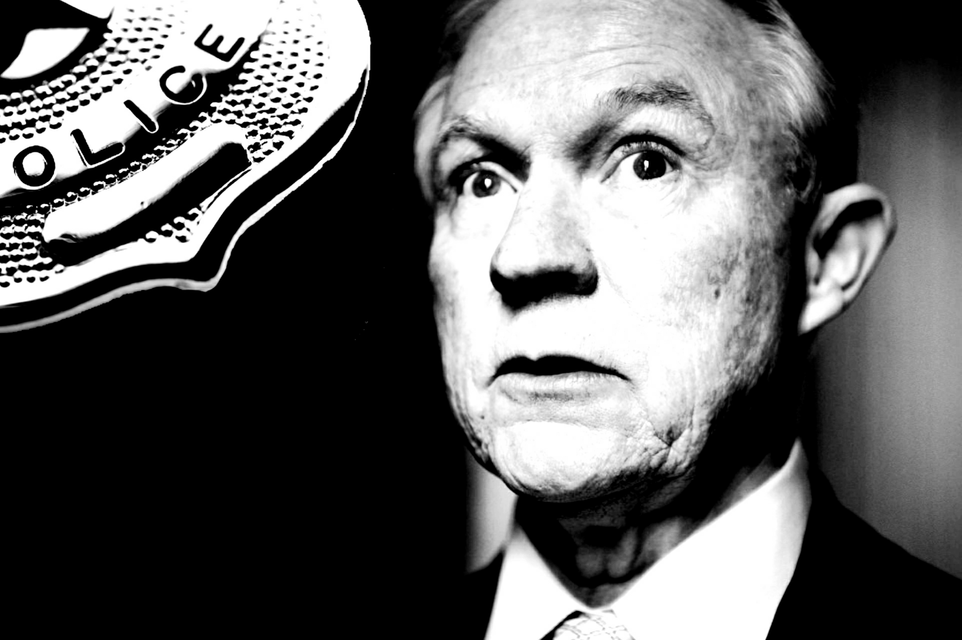LISTEN TO TLR’S LATEST PODCAST:
By Kitty Testa
As I rode into work Friday morning, I switched on the radio and happened upon The Mike Gallagher Show. I caught him in mid-sentence, complaining about malcontents who criticize the police. He was discussing the fatal shooting of Justine Damond by Minneapolis police officer, Mohamed Noor. Apropos of nothing, Gallagher quickly pivoted to another story in the news, that of Officer Scott Naff of the Virginia Department of Game and Inland Fisheries, who was denied service at a McDonald’s drive-thru while he was in uniform. “This is the kind of thing that police have to put up with every day!” said Gallagher, as if suffering a slight at a McDonald’s drive-thru were the equivalent of losing one’s life to a police bullet. The Police State has its fans.
There is a dangerous hero-worship of police in particular and law enforcement in general, specifically among neoconservatives. The police are always right; the civilian is always wrong. When police kill or injure a civilian, the civilian had it coming, as if the proper role of police is to serve as holy agents of karma. When the actions of a police officer are ridiculously difficult to justify, the actions are excused because “police have a hard job.”
During Donald Trump’s campaign for president, the candidate made clear his affinity for the law-and-order crowd. He praised “our men and women in blue.” He stood shoulder-to-shoulder with Maricopa County, AZ Sheriff Joe Arpaio, whose treatment of prisoners in his Tent City Jail (which is currently being shuttered) has been inhumane. Using examples like the city of Chicago’s bloody street violence, Trump’s campaign speeches painted a horrific picture of escalating crime in America, despite the fact that, on the whole, violent crime has been decreasing overall.
Attorney General Jeff Sessions was an early Trump supporter, and Trump praised him effusively during his campaign. It was obvious that Sessions would be granted a high-ranking position in Trump’s cabinet. I was hoping he might be named ambassador to Zanzibar or something equally innocuous, where the former senator and Alabama Attorney General could do little harm to the country. When Trump nominated Jeff Sessions as Attorney General I knew that Trump was serious about his unquestioning support for law enforcement, including its excesses.
About 2.2 million people are incarcerated in the United States in federal, state and local jails. About 20% of them have never been convicted of a crime and are simply unable to make bail. 35% of prisoners have been convicted of violent offenses, while 16% have convictions for drug offenses. The remaining 29% or so are split evenly between inmates who have been found guilty of property crimes, and those who were found guilty of public order offenses, including weapons charges. We have no idea how many are actually innocent, but both 2015 and 2016 were record years for proving wrongful convictions, and 2017 is proving to be on track to break those records.
Evidently there aren’t enough prisoners in the United States for Jeff Sessions.
Sessions has made it clear that he believes that many more of his countrymen deserve to be rotting away in prison, and given far longer sentences. As chief law enforcement officer of the United States, Sessions supports policies that will lead to more abuse by law enforcement across the country, more people charged with crimes, and more people in jail for non-violent offenses. Not one of these five policies will make us any safer, and may put innocent people at greater risk as they increase the power of police and threatens individuals’ rights.
1. Escalating the Failed War on Drugs

If you’re sitting in your living room enjoying a marijuana cigarette or a whiff of hash oil, Jeff Sessions believes you ought to be in prison. Seriously. He would think it perfectly reasonable to send a SWAT team into your home to terrorize you and your family. If they happened to kill you or someone else in your home, well, that would be your fault. Sessions is a drug warrior with a deep-seated hostility towards drug users. At a Senate drug hearing in April 2016, he stated, “good people don’t smoke marijuana.”
I, myself, prefer scotch on the rocks or a classic gin martini, but my particular drug of choice doesn’t bother Mr. Sessions. When my kids were teenagers, I warned them about the dangers of drugs, specifically addictive drugs such as heroin and cocaine that they were certain to encounter. When it came to pot, I warned them about the dangers of the police. While the opioid epidemic was developing, with upper-middleclass teens overdosing on oxycodone and heroin, law enforcement’s response was to go after marijuana with a vengeance, as if picking up every kid with a pipe in his pocket was going to address the health crisis of addiction. Focusing on a non-causal correlation between cannabis users and heroin users, law enforcement determined that to save kids from heroin, we needed to save them from weed. Science does not back up this claim, and it has fallen out of favor with the populace, and now most Americans support decriminalization of marijuana.
The congress was so concerned about the AG’s belief in reefer madness that they specifically adopted a budget amendment that prohibited the Department of Justice from using any of its allocated funds to prevent any state “from implementing their own laws that authorize the use, distribution, possession, or cultivation of medical marijuana.”
In addition to Sessions’ irrational fear of pot, there are other reasons the War on Drugs has been maintained for so long. The myriad of government employees who work in law enforcement are now welcoming the AG’s position. Surely, some of them have good intentions, but many derive income and power from drug criminalization. Prohibition has been very profitable for many stakeholders. More drug laws means we need more cops. More prosecutors and defense attorneys. More judges. More courtrooms. More jails. More lab technicians. More probation and parole officers. More fines. More pharmaceuticals. The participants in the War on Drugs are in some ways no different than a pusher who wants to get you addicted. Both are in it for profit and neither cares if you’re a victim of their enterprise.
2. Supporting Civil Asset Forfeiture

Civil asset forfeiture may be the most un-American law on the books. First, for the state to lay claim to your assets, the state needn’t even charge you with a crime. Second, in the civil legal procedure, you are tasked to prove that you did not obtain your property through illicit means, i.e., you are presumed guilty. Also, if you cannot afford a lawyer, one will not be provided to you by the state, because the process is—quite cleverly—civil as opposed to criminal.
Civil asset forfeiture has been the Howitzer in the War on Drugs. The idea was simple: take drug money away from drug dealers and use it to fund police departments, who share in the proceeds of the property they lay claim to by mere suspicion. Who knew that a few decades on police departments would end up funneling billions of dollars in seized property to the Department of Justice? While the fight against illegal drugs was initially the rationale for those who supported the program, most certainly it’s been a cash cow, and they don’t want to give that up, including Jeff Sessions. While many states have been reforming their asset forfeiture laws to address abuses, the Attorney General issued a directive aimed to override such reforms.
So now, even if your state has curtailed or eliminated civil asset forfeiture programs, you are not safe from having your cash, car or house stolen by the police just because they happen to think you’re up to no good.
3. Seeking the Highest Possible Charges Against Suspects

Another of Sessions’ directives instructs US attorneys to pursue the highest charges possible against all indictable suspects. This is an about face from the Obama administration’s policy to avoid mandatory minimum sentences for low-level drug offenders. As a blanket policy, this may result in those who should be charged with manslaughter being charged with first-degree murder, or those who should be charged with assault being charged with battery, or a person who sells cannabis oil in one state to a sick relative in another state would be tried just as if he were a drug king pin.
This policy may, in fact, backfire. The DOJ may find that juries are not likely to concur with severe charges that result in extended, harsh sentences for people whom they feel may have had extenuating circumstances. They can’t count on every juror to be a fan of The Mike Gallagher Show.
Sessions’ directive also deprives prosecutors who are familiar with facts of a case of the ability to make a discretionary call about how to proceed with charges. It is a blanket push to put more people in jail for longer periods of time.
4. Pushing Mandatory Minimum Sentences

Along with pushing for the most severe criminal charges, Sessions also strongly supports mandatory minimum sentences which were introduced in the 1980s and were codified in 1994 at the federal level.
Mandatory minimum sentences were implemented to undercut judicial discretion as many felt that too many judges were soft on crime. The sentencing rules also include so-called three-strikes laws, where mandatory life sentences were established for those who received three felony convictions. Because many felony convictions are related to drug possession, many non-violent offenders have ended up serving life sentences.
The end result has been a massive increase in prisoners in the United States that is costly to taxpayers and has placed increased economic pressure on already impoverished communities. Despite the fact that crime is decreasing, AG Sessions, along with a lot of Americans, support these punitive policies against non-violent offenders, despite the fact that they don’t affect violent crime rates.
Ironically, neoconservatives who generally support lower taxes do not seem to see the connection between rising taxes and the costs of law enforcement from cops on the beat to housing the prison population.
5. Rejection of Forensic Science Reforms

The National Commission on Forensic Science was an advisory panel to the DOJ which was chartered in 2013 to address junk science used as forensic evidence, faulty interrogation techniques, and other procedural flaws in law enforcement. Sessions did not renew the commission when its second term expired in April.
It’s quite possible that the people who make up juries across the country have developed an admiration for forensic science from watching TV shows which have glamorized the profession, from the 1970s show Quincy, M.E. to the current iterations of CSI. In reality, forensic science is not fool-proof. Bite mark analysis, firearms identification, hair sampling, and a variety of other forensic methods are not scientifically validated.
According to The Innocence Project, the misapplication of forensic science is the culprit in 46% of wrongful convictions based on DNA evidence.
Still, many people are convicted based on faulty forensic evidence, and law enforcement clings dearly to these methods because it helps them do what they aim to do: put more people in jail.
Attorney General Jeff Sessions is now the leader of the Prison Industrial Complex. He is hostile to individual rights, states’ powers to reflect their citizens’ views on law enforcement, and to any reforms that would improve our criminal justice system. Recently President Trump has expressed frustration with Sessions, not for the reasons outlined here, but because he did not believe that Sessions should have recused himself from the investigation into Russian influence during the 2016 election. Regardless of Trump’s reasons, Sessions was a poor choice to head the DOJ, and we will all be better served if Trump makes a call to Sessions and says, “You’re fired.”





20 comments
online casino games
golden nugget online casino
red dog casino
casino online slots
cheap viagra online canadian pharmacy
female viagra
real money casino
real money online casino
hollywood casino online real money
slot games online
online payday loans
cash loan
online loans
loans for bad credit
cash loan
personal loan
cialis buy
cialis internet
cialis 20
generic for cialis
cialis to buy
cialis buy
cialis buy
cialis to buy
viagra buy
generic for viagra
online slots for real money
real money casino games
free slots
rivers casino
golden nugget online casino
online casino real money usa
viagra coupon
cheap viagra online
viagra cost
generic name for viagra
tadalafil 40 mg
cialis coupon
Buy viagra in us
Pfizer viagra 50mg